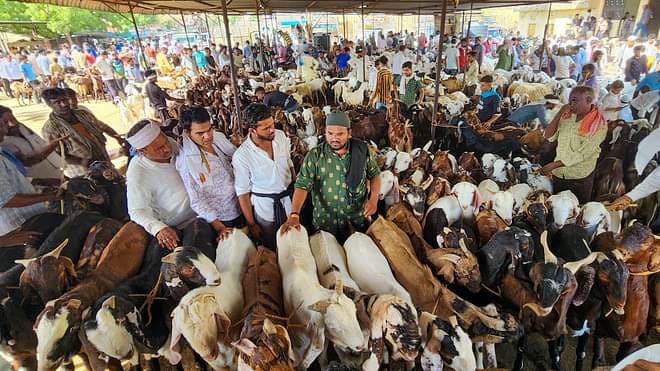New Delhi, June 19: In a controversial display of compassion, members of the Jain community in Chandni Chowk, Delhi, managed to save over 100 goats from being sacrificed during Bakrid, or Eid al-Adha. The festival, celebrated by Muslims worldwide, involves the sacrifice of animals such as sheep, goats, cows, or camels, with the meat distributed to the needy and poor.
Led by a man named Vivek, the Jains devised a plan to ‘rescue’ the animals. “This is a powerful Jain mantra to bring peace and positivity,” Vivek explained, playing the mantras through speakers to calm the goats. “These goats are afraid because they think they have been gathered for slaughter. They don’t know we have given them a new lease of life.”
The Naya Jain Mandir in Dharampur buzzed with excitement, similar to the bustling goat markets ahead of Bakrid. Many Jains visited the temple to see the goats, pet them, and donate money for their fodder. For some, this act of “goat darshan” boosted their religious virtues.
“We are really proud of ourselves,” Vivek said, noting the contributions from community members nationwide. “We call it social welfare, and this is what our religion teaches us. This is a historic moment for the Jain community of Chandni Chowk.”
A team of 25 Jains carried out the plan, conducting surveys of areas where goats were sold. According to Chirag Jain, another community member, they posed as Muslim buyers to avoid suspicion and inflated prices. “Had they known we were non-Muslims, they would have sold the goats to us at a higher price, and we wanted to rescue as many goats as possible.”
After tough bargaining, the team managed to purchase the goats at an average price of Rs 10,000 each. The excitement was palpable as they successfully rescued over 100 goats. Funds were raised from across Gujarat, Punjab, Maharashtra, Kerala, and Hyderabad, with leftover money used to buy fodder.
However, this act of compassion has sparked a significant debate. Many non-Muslims, including Jains and Hindus, consume meat regularly, and many Hindus are involved in the meat business. Large corporations like KFC and McDonald’s slaughter thousands of animals daily to serve their wealthy customers, a stark contrast to the Islamic tradition where meat from sacrificed animals during Bakrid is distributed to the poor and needy.
The natural food chain and food cycle inherently involve humans consuming meat. Given this context, some view the Jain community’s efforts as misguided. “Why such foolishness?” some argue, pointing out the hypocrisy in criticizing one tradition while overlooking the widespread consumption of meat in other contexts.
The initiative has highlighted the complex interplay between religious values, cultural practices, and animal welfare. While it has garnered significant praise on social media, it has also ignited discussions about the ethics of meat consumption and the varying practices across different communities. The Naya Jain Mandir and the Old Delhi area have received newfound attention, bringing these debates to the forefront.




